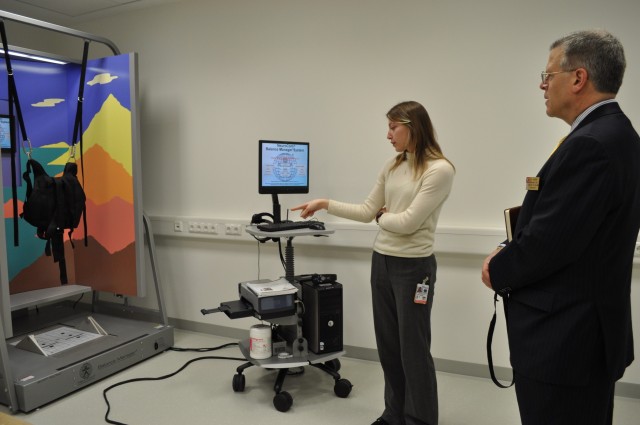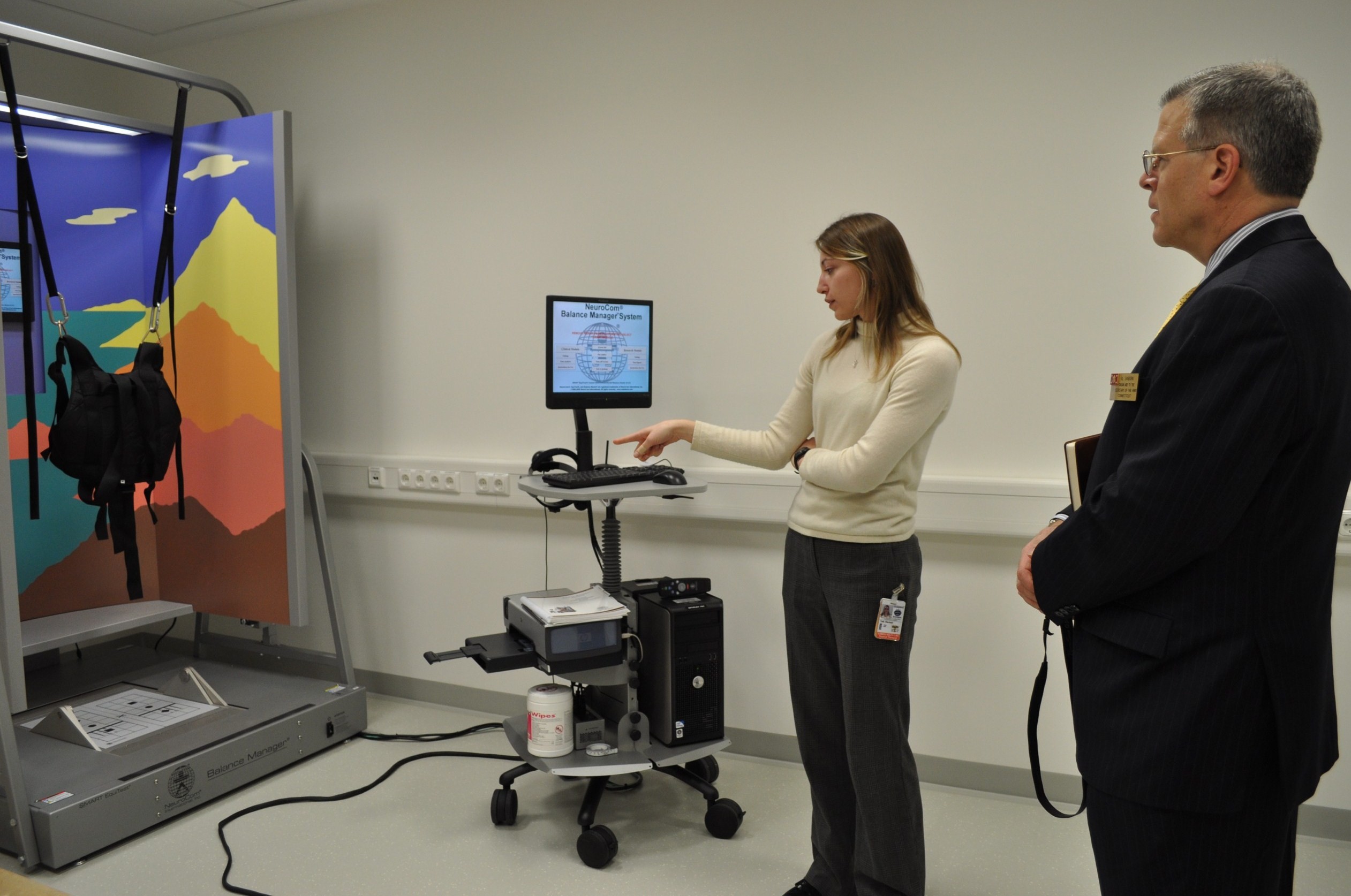
BAMBERG, Germany -- Since 2000, the Defense and Veterans Brain Injury Center has counted 178,876 cases of Traumatic Brain Injury (TBI) amongst U.S. Military personnel. Seventy-seven percent of those cases were determined to be mild. Based on these numbers, the number of confirmed cases of TBIs has surpassed recorded cases of Post Traumatic Stress Disorder (PTSD) by nearly 100,000.
The Army has responded to these numbers by increasing behavioral health and clinic services, teaching Soldiers to recognize evidence of TBI or PTSD in themselves and their battle buddies and implementing treatment programs at installations across the globe.
Warner Barracks established a mild Traumatic Brain Injury (mTBI) program more than two years ago, working alongside behavioral health employees. Eventually the need for more space and equipment led the program to move to its own facility, occupying Preston Hall in late 2009.
Soon after the move, Sindy McCord, occupational therapist (OT) at the clinic, flew to Fort Campbell, Ky., to observe one of the Army's top mTBI courses, the Warrior Resiliency Program.
The program, one that Bamberg's mTBI clinic has imitated, is a dynamic assessment and progression program meant to assist Soldiers who have sustained an mTBI and want to return to active duty service.
The Warrior Resiliency Program, and now Bamberg's Return to Duty program, utilize a team of health care professionals to assess and observe Soldiers during simulated war zone and training scenarios. Based on a Soldier's functionality through simulated fire fights and other training events, the team determines their physical and mental preparedness to return to Active Duty.
McCord realized after her trip that this aspect of rehabilitating Soldiers was missing from Bamberg's program.
"It certainly was a benefit to have support from the Fort Campbell staff and model their ideas," McCord said. "Bamberg is a much smaller community so we have tailored our program to run differently."
McCord contacted Bamberg's Training and Support Center Director Daniel Cintron.
"This allowed me to coordinate access to the training area where we provide real-life simulated scenarios," McCord said. "Also, gaining the support of the command at the health clinic allowed us to access one of the medics on staff to be an integral part of the team."
Military personnel, particularly medics, have been key in determining interaction between Soldiers in the scenarios.
"Another factor that shaped the program is the Soldiers themselves in sharing what Soldier skills could be used to assess their ability to perform their duties," McCord said.
One of those Soldiers is Sgt. Juan Tovar, 630th Military Police Company. Having graduated from the Bamberg mTBI clinic's rehabilitation program in early fall, Tovar helped program personnel create realistic training and war zone situations.
"I helped Sindy come up with different scenarios and told her things that we might go through or experience downrange," Tovar said. "I used my personal experience and basic training. We've mixed that into some of the things in Return to Duty, some of the scenarios."
The coordination of various post organizations is crucial to provide Return to Duty participants with the proper equipment, space and personnel.
McCord said with the support of TASC and the command, "we are able to provide realistic challenges and have military medical support to provide insight into their performance. We recently have had unit commands join us in communication on developing this program and that military support will enhance the process greatly."
According to experts, the effects of an mTBI, if caught in time, can be completely reversed.
"The majority of individuals with mTBI recover within 90 days of their initial injury," said Dr. Juan Hill, neuropsychologist. "Since many of the cases that we treat are complicated by issues such as physical injury, traumatic stress and general post-deployment adjustment concerns, their care is somewhat more complicated, and generally requires the concerted effort of a number of different specialties. Since our opening, we have successfully returned several service men and women back to duty and helped them to reintegrate back into the general military community over time."
"Given the right environment, support and treatment a mild Traumatic Brain event usually heals and does not become a lifelong issue," said Dr. Kuno P. Zimmermann. "Our goal with this program is to provide the support, rehabilitation and reintegration."
Tovar was able to receive treatment at the clinic, but is concerned that too many Soldiers are ignoring or not recognizing mTBI symptoms in themselves.
"If a Soldier is coming back from downrange and someone's saying something's wrong with you, or different, whether it's family members, a spouse or another Soldier, there might be," Tovar said. "You think you know yourself but sometimes someone else sees something different. It's at least worth getting checked out."
Similar to the set up of the mTBI rehabilitation program, Return to Duty is a three stages program.
First, the team determines if a Soldier needs to participate in mTBI rehabilitation and then through collaboration with the Soldier it is determined if he or she needs to participate in all the phases of the Return to Duty tasks, said Rachael Taft, physical therapist.
Units from the 173rd Airborne Brigade Combat Team stationed in Bamberg have already shown interest in the program. The brigade just returned from a 12-month deployment to Afghanistan.
The clinic will be hosting a Return to Duty demo for unit leaders.
"They are interested in involvement on a weekly basis to monitor progress of their Soldiers who are enrolled in the program," McCord said.
The assessing health care team includes a variety of specialties. As an OT, McCord's role is vital in preparing rehabilitation procedures geared toward a workplace environment.
"Occupational performance is the driving force for the development of the program, assessing Soldier functional abilities at work," McCord said. "Specifically OT comments on the cognitive, visual and fine motor skills, while physical therapy observes balance and vestibular reactions and the mental health team would be involved to manage psychological stress and anxiety. We are observing safety, judgment, generally how well they adapt to the stressful environment."
As the clinic program continues to develop, there is a desire to incorporate PTSD exposure therapy, McCord added.
For some Soldiers, mTBI treatment has made a huge difference in their careers.
"This is something that can really help," Tovar said. "I got the help I needed and I'm back to training Soldiers and patrolling Bamberg."
For now, Return to Duty will focus on activating Soldiers who will go through scenarios as a small unit. Other advances at the mTBI clinic include the development of a video connection for web-based conferences or consultations between staff members at various locations.
Related Links:
U.S. Army Installation Management Command
Military progresses in identifying, treating brain, mental injuries
STAND-TO!: Traumatic Brain Injury
Army Behavioral Health - Post-Deployment Information

Social Sharing